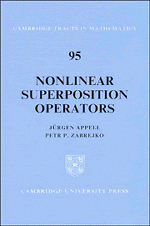Book contents
- Frontmatter
- Contents
- Preface
- Chapter 1 The superposition operator in the space S
- Chapter 2 The superposition operator in ideal spaces
- Chapter 3 The superposition operator in Lebesgue spaces
- Chapter 4 The superposition operator in Orlicz spaces
- Chapter 5 The superposition operator in symmetric spaces
- Chapter 6 The superposition operator in the spaces C and BV
- Chapter 7 The superposition operator in Hölder spaces
- Chapter 8 The superposition operator in spaces of smooth functions
- Chapter 9 The superposition operator in Sobolev spaces
- Bibliography
- List of Symbols
- Subject Index
Chapter 4 - The superposition operator in Orlicz spaces
Published online by Cambridge University Press: 05 February 2012
- Frontmatter
- Contents
- Preface
- Chapter 1 The superposition operator in the space S
- Chapter 2 The superposition operator in ideal spaces
- Chapter 3 The superposition operator in Lebesgue spaces
- Chapter 4 The superposition operator in Orlicz spaces
- Chapter 5 The superposition operator in symmetric spaces
- Chapter 6 The superposition operator in the spaces C and BV
- Chapter 7 The superposition operator in Hölder spaces
- Chapter 8 The superposition operator in spaces of smooth functions
- Chapter 9 The superposition operator in Sobolev spaces
- Bibliography
- List of Symbols
- Subject Index
Summary
Whenever one has to deal with problems involving rapidly increasing nonlinearities (e.g. of exponential type), Orlicz spaces are more appropriate than Lebesgue spaces. Since Orlicz spaces are ideal spaces, many statements of this section are just reformulations of the general results of Chapter 2, and therefore are cited mostly without proofs. However, in contrast to Lebesgue spaces, several new features occur in Orlicz spaces. For instance, the superposition operator may act from one Orlicz space into another and be bounded but not continuous, or continuous but not bounded.
It turns out again that F is weakly continuous between Orlicz spaces if and only if f is affine in u. Further, the Lipschitz and Darbo conditions for F coincide, as in Lebesgue spaces, and one gets the same “degeneracy” phenomenon if the second space is “essentially smaller” than the first one.
As in Lebesgue spaces, one can give conditions for differentiability and asymptotic linearity which are both necessary and sufficient. Again, f reduces to an affine function if F is differentiate from a “large” into a “small” space. On the other hand, the class of analytic superposition operators in Orlicz spaces is reasonably large; in contrast to Lebesgue spaces, a degeneration to polynomials occurs only under an additional restriction on the first space.
Orlicz spaces
As before, let Ω be an arbitrary set, M some σ-algebra of subsets of Ω, and µ, a σ-finite and countably additive measure on M; together with µ we shall sometimes consider an equivalent normalized countably additive measure λ (see Section 1.1).
- Type
- Chapter
- Information
- Nonlinear Superposition Operators , pp. 119 - 140Publisher: Cambridge University PressPrint publication year: 1990

